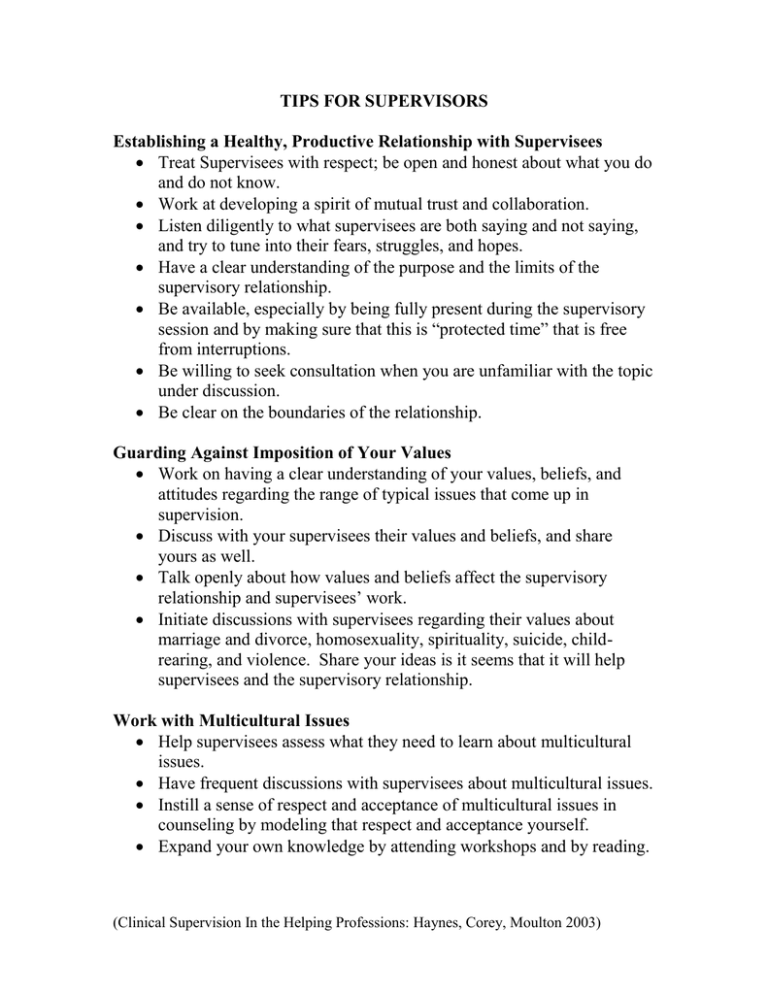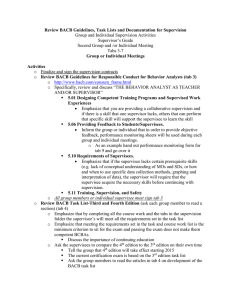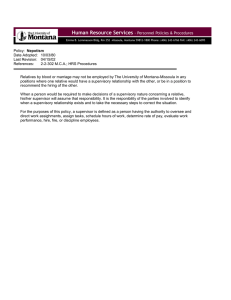TIPS FOR SUPERVISORS Establishing a Healthy, Productive Relationship with Supervisees
advertisement

TIPS FOR SUPERVISORS Establishing a Healthy, Productive Relationship with Supervisees Treat Supervisees with respect; be open and honest about what you do and do not know. Work at developing a spirit of mutual trust and collaboration. Listen diligently to what supervisees are both saying and not saying, and try to tune into their fears, struggles, and hopes. Have a clear understanding of the purpose and the limits of the supervisory relationship. Be available, especially by being fully present during the supervisory session and by making sure that this is “protected time” that is free from interruptions. Be willing to seek consultation when you are unfamiliar with the topic under discussion. Be clear on the boundaries of the relationship. Guarding Against Imposition of Your Values Work on having a clear understanding of your values, beliefs, and attitudes regarding the range of typical issues that come up in supervision. Discuss with your supervisees their values and beliefs, and share yours as well. Talk openly about how values and beliefs affect the supervisory relationship and supervisees’ work. Initiate discussions with supervisees regarding their values about marriage and divorce, homosexuality, spirituality, suicide, childrearing, and violence. Share your ideas is it seems that it will help supervisees and the supervisory relationship. Work with Multicultural Issues Help supervisees assess what they need to learn about multicultural issues. Have frequent discussions with supervisees about multicultural issues. Instill a sense of respect and acceptance of multicultural issues in counseling by modeling that respect and acceptance yourself. Expand your own knowledge by attending workshops and by reading. (Clinical Supervision In the Helping Professions: Haynes, Corey, Moulton 2003) CHARACTERISTICS OF AN EFFECTIVE SUPERVISOR Aware of clinical, legal, and ethical issues Possesses good clinical skills Demonstrates empathy, respect, genuineness, listening Establishes an accepting supervisory climate Creates a supervisory relationship characterized by trust and respect Determines the developmental level of the supervisee and provides supervision methods that will best serve the training needs of the supervisee Has a sense of humor Develops clear boundaries Encourages appropriate risk-taking on the part of supervisees Supports a collaborative supervisory process Respects the knowledge supervisees bring to the supervisory relationship Appreciates individual differences among supervisees and differing opinions about theoretical viewpoints Is open, approachable, and supportive Has a keen interest in training and supervision Shows sensitivity to the anxieties and vulnerabilities of supervisees Values supervision sessions as “protected” time Provides honest constructive feedback INEFFECTIVE CHARACTERISTICS OF A SUPERVISOR Rigid Closed to Feedback Act as if they have all the answers Use supervision as a forum to display their knowledge





